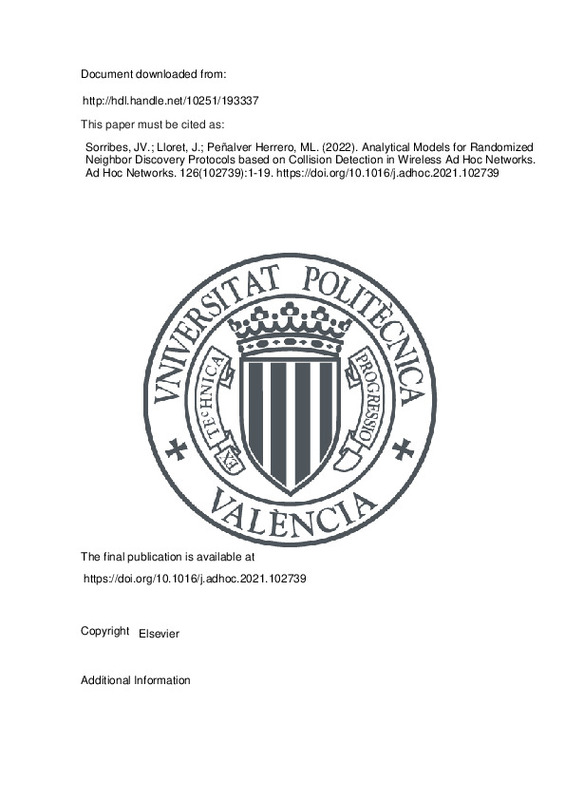JavaScript is disabled for your browser. Some features of this site may not work without it.
Buscar en RiuNet
Listar
Mi cuenta
Estadísticas
Ayuda RiuNet
Admin. UPV
Desde el lunes 3 y hasta el jueves 20 de marzo, RiuNet funcionará en modo de solo lectura a causa de su actualización a una nueva versión.
Analytical Models for Randomized Neighbor Discovery Protocols based on Collision Detection in Wireless Ad Hoc Networks
Mostrar el registro sencillo del ítem
Ficheros en el ítem
| dc.contributor.author | Sorribes, José Vicente
|
es_ES |
| dc.contributor.author | Lloret, Jaime
|
es_ES |
| dc.contributor.author | Peñalver Herrero, Mª Lourdes
|
es_ES |
| dc.date.accessioned | 2023-05-12T18:02:18Z | |
| dc.date.available | 2023-05-12T18:02:18Z | |
| dc.date.issued | 2022-03-01 | es_ES |
| dc.identifier.issn | 1570-8705 | es_ES |
| dc.identifier.uri | http://hdl.handle.net/10251/193337 | |
| dc.description.abstract | [EN] Neighbor discovery is a crucial first step after the deployment of wireless ad hoc networks, which do not have a communications infrastructure. In this paper we present analytical models of randomized neighbor discovery protocols for static one-hop environments: CDPRR (Collision Detection Probabilistic Round Robin) and CDH (Collision Detection Hello). For CDPRR we assumed a geometric distribution and a uniform distribution for CDH. For comparison purposes, we chose two protocols from the literature, i.e., Hello and PRR, to be used as reference. To assess the performance of the proposals we carried out a mathematical study regarding six metrics, i.e., neighbor discovery time, energy consumption, overhead (number of packets sent), packet delivery ratio, the CDF of discoveries, and percentage of idle slots, and presented graphical results obtained from the equations. According to the analytical results, CDH protocol outperforms the other solutions regarding the neighbor discovery time, energy consumption, number of packets sent, packet delivery ratio and CDF of discoveries, while CDPRR achieves good results and it is better than Hello and PRR in terms of neighbor discovery time, energy consumption, CDF of discoveries and the overhead (number of packets sent). Moreover, we found that CDPRR presents more percentage of idle slots than PRR, which is a clear advantage in terms of energy consumed and number of packets sent. In addition, as novelty compared to the reference protocols, we found that both CDH and CDPRR protocols manage to discover all the neighbors, know when to terminate the discovery process, and achieve to operate under more realistic assumptions. We also focused the study on the CDH protocol varying the slot width, and demonstrated that the number of nodes in the network can be unknown, still providing reasonable results. | es_ES |
| dc.description.sponsorship | This work has been partially supported by the "Ministerio de Economia y Competitividad'' in the "Programa Estatal de Fomento de la Investigacion Cientifica y Tecnica de Excelencia, Subprograma Estatal de Generacion de Conocimiento'' within the project under Grant TIN2017-84802-C2-1-P. This work has also been partially supported by European Union through the ERANETMED (Euromediterranean Cooperation through ERANET joint activities and beyond) project ERANETMED3-227 SMARTWATIR. | es_ES |
| dc.language | Inglés | es_ES |
| dc.publisher | Elsevier | es_ES |
| dc.relation.ispartof | Ad Hoc Networks | es_ES |
| dc.rights | Reconocimiento - No comercial - Sin obra derivada (by-nc-nd) | es_ES |
| dc.subject | Wireless ad hoc networks | es_ES |
| dc.subject | Neighbor discovery | es_ES |
| dc.subject | Randomized protocol | es_ES |
| dc.subject | Analytical model One-hop | es_ES |
| dc.subject | Collisions | es_ES |
| dc.subject.classification | ARQUITECTURA Y TECNOLOGIA DE COMPUTADORES | es_ES |
| dc.subject.classification | INGENIERÍA TELEMÁTICA | es_ES |
| dc.title | Analytical Models for Randomized Neighbor Discovery Protocols based on Collision Detection in Wireless Ad Hoc Networks | es_ES |
| dc.type | Artículo | es_ES |
| dc.identifier.doi | 10.1016/j.adhoc.2021.102739 | es_ES |
| dc.relation.projectID | info:eu-repo/grantAgreement/AEI/Plan Estatal de Investigación Científica y Técnica y de Innovación 2013-2016/TIN2017-84802-C2-1-P/ES/RED COGNITIVA DEFINIDA POR SOFTWARE PARA OPTIMIZAR Y SECURIZAR TRAFICO DE INTERNET DE LAS COSAS CON INFORMACION CRITICA/ | es_ES |
| dc.relation.projectID | info:eu-repo/grantAgreement/EC//ERANETMED3-227 SMARTWATIR/ | es_ES |
| dc.rights.accessRights | Abierto | es_ES |
| dc.contributor.affiliation | Universitat Politècnica de València. Escuela Politécnica Superior de Gandia - Escola Politècnica Superior de Gandia | es_ES |
| dc.contributor.affiliation | Universitat Politècnica de València. Escola Tècnica Superior d'Enginyeria Informàtica | es_ES |
| dc.description.bibliographicCitation | Sorribes, JV.; Lloret, J.; Peñalver Herrero, ML. (2022). Analytical Models for Randomized Neighbor Discovery Protocols based on Collision Detection in Wireless Ad Hoc Networks. Ad Hoc Networks. 126(102739):1-19. https://doi.org/10.1016/j.adhoc.2021.102739 | es_ES |
| dc.description.accrualMethod | S | es_ES |
| dc.relation.publisherversion | https://doi.org/10.1016/j.adhoc.2021.102739 | es_ES |
| dc.description.upvformatpinicio | 1 | es_ES |
| dc.description.upvformatpfin | 19 | es_ES |
| dc.type.version | info:eu-repo/semantics/publishedVersion | es_ES |
| dc.description.volume | 126 | es_ES |
| dc.description.issue | 102739 | es_ES |
| dc.relation.pasarela | S\450796 | es_ES |
| dc.contributor.funder | European Commission | es_ES |
| dc.contributor.funder | Agencia Estatal de Investigación | es_ES |







![[Cerrado]](/themes/UPV/images/candado.png)

